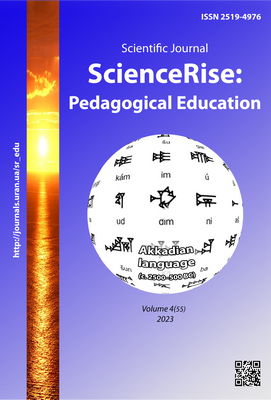Social-pedagogical aspects in working with Roma communities
DOI:
https://doi.org/10.15587/2519-4984.2023.289914Keywords:
Roma community, discrimination, identity, community, stigmatization, strategy, infrastructure, social inclusion, education, national minoritiesAbstract
The Roma community has always been of interest to researchers and activists in numerous countries around the world due to its rich history and unique culture. The language, traditions, religion, history, and way of life of the Roma are distinctive and marked by their uniqueness. However, the Roma community also faces significant social and economic challenges that affect their opportunities and quality of life. In this context, working with Roma communities holds great socio-pedagogical significance.
The socio-pedagogical aspects of this work encompass a complex set of measures and strategies, aimed at improving the quality of life for the Roma people, increasing the level of education among children and youth, and promoting their social inclusion and adaptation to a broader society. The relevance of this research is closely tied to the necessity of ensuring the social inclusion of the Roma community, which encounters various forms of discrimination and challenges in various aspects of life. Ensuring human rights for the Roma is a globally relevant issue, and research in the fields of social work and pedagogy can contribute to improving their situation.
This research aims to understand the complex interrelationships between the Roma community and society at large and to identify best practices and strategies that can enhance the lives of Roma communities and facilitate their integration into various aspects of societal life.
The practical significance of this research lies in the possibility of developing programs and initiatives, aimed at improving the lives of Roma communities. These programs will contribute to the social integration of the Roma, the preservation of their culture and identity. Understanding the socio-cultural context of Roma communities and addressing their needs are key to successful work with this community. The research also underscores the importance of combating stigma and discrimination based on ethnicity and promotes the creation of a more just and inclusive society. Supporting the development of Roma communities at the local level, including improving infrastructure and fostering self-organization, is a crucial step in building more resilient and active Roma communities
References
- Habryn, P. (2022). Orhanizatsiino-upravlinski problemy romskykh vnutrishno-peremishchenykh osib u Zakarpatskii oblasti v umovakh voiennoho stanu v Ukraini. Format rozvytku vidnosyn Ukrainy ta krain Tsentralnoi Yevropy u konteksti rosiisko-ukrainskoi viiny. Uzhhorod: TOV «RIK-U», 197–200.
- Habryn, P. V., Tokar, M. Yu. (2023). Some aspects of formation of characteristics of management culture among roma: on the example of the Zakarpats’ka oblast’ of Ukraine. Efficiency of Public Administration, 3 (72), 9–14. https://doi.org/10.36930/507201
- Polivko, L. Yu., Yaroshenko, A. O. (2017). Poserednytstvo yak forma sotsialnoi roboty z natsionalnoiu menshynoiu romiv. Sotsialna robota v Ukraini: teoriia i praktyka, 1-2, 75–82.
- Polivko, L. Yu.; Yaroshenko, A. O. (Ed.) (2018). Sotsialno-psykholohichni aspekty vkliuchennia romskoi hromady v sotsialnu vzaiemodiiu. Sotsialna polityka suchasnoho ukrainskoho suspilstva: sotsialno-zakhysnyi kontekst. Kyiv: Vyd-vo NPU imeni M. P. Drahomanova, 167–175.
- Labosh, K. (2019). Osoblyvosti osvity ditei romskoho naselennia: suchasnyi stan, problemy ta tendentsii rozvytku. Sotsiolohiia ta sotsialna robota v umovakh natsionalnykh ta rehionalnykh vyklykiv. Uzhhorod: Hoverla, 56–57.
- Winman, T. (2018). The cultural brokering power of social pedagogy in education for Roma students. Nordic Social Work Research, 9 (1), 5–17. https://doi.org/10.1080/2156857x.2018.1463284
- Koleva, M. (2020). Educational Environment – A Social Project of Support for the Social Development of a Roma Child. Open Journal for Educational Research, 4 (1), 67–76. https://doi.org/10.32591/coas.ojer.0401.05067k
- Korobka, L., Vasiutynskyi, V., Vinkov, V. (2022). Pidtrymka styhmatyzovuvanykh menshyn: sotsialno-psykholohichni tekhnolohii. Kropyvnytskyi: Imeks-LTD, 178.
- Youth in action and the Roma community. Inclusion of diversity, 33. Available at: https://www.salto-youth.net/downloads/4-17-1799/Booklet%20Youth%20in%20Action%20and%20the%20Roma%20Community.pdf
- The innovatory practices in the field of education of Roma children. Council of Europe, 40. Available at: https://www.coe.int/t/dg4/education/roma/Source/GoodPractice_EN.PDF
Downloads
Published
How to Cite
Issue
Section
License
Copyright (c) 2023 Larysa Polivko

This work is licensed under a Creative Commons Attribution 4.0 International License.
Our journal abides by the Creative Commons CC BY copyright rights and permissions for open access journals.
Authors, who are published in this journal, agree to the following conditions:
1. The authors reserve the right to authorship of the work and pass the first publication right of this work to the journal under the terms of a Creative Commons CC BY, which allows others to freely distribute the published research with the obligatory reference to the authors of the original work and the first publication of the work in this journal.
2. The authors have the right to conclude separate supplement agreements that relate to non-exclusive work distribution in the form in which it has been published by the journal (for example, to upload the work to the online storage of the journal or publish it as part of a monograph), provided that the reference to the first publication of the work in this journal is included.







